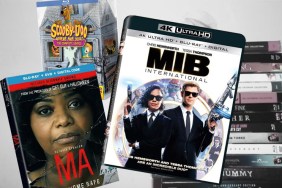Martin Scorsese and Mick Jagger assembled to create it. It was to be run mostly by Terence Winter, one of the more known writers of The Sopranos, and the show-runner for the acclaimed Boardwalk Empire. It was backed by a sizable budget, and a slew of talented actors including Bobby Cannavale, Juno Temple, and many others. It ran in a prime spot on HBO. It had enough clout to acquire the broadcasting rights to a massive, massive catalogue of period-appropriate 1970s rock; each episode had a killer soundtrack unto itself.
Despite all of these things, HBO’s Vinyl only ran 10 episodes from February ’til April 2016. The show, it turns out, just wasn’t well-written enough, and didn’t have enough of a general dramatic direction it was facing. It was a cliche story and a lot of nostalgia. And that wasn’t enough to keep it alive. It was canceled after only a single season.
Check Out: SoundTreks | Garden State
By the way, if you want to hear the co-hosts of Crave’s The B-Movies Podcast analyzing the entirety of Vinyl, you can listen to a recent episode of Canceled Too Soon, a podcast devoted to TV shows that lasted one season or less.
The one thing the show did excel in was its excellent, excellent musical selections. Not everything necessarily came from 1973 (when the show was set), but everything was carefully curated with the eye and the ear of a true expert. There are no gimmes in Vinyl. No cheap shots. None of the hugely familiar pop hits of the time to ensure audiences sit in a complacent fog of comforting musical threatlessness. The soundtrack to Vinyl attempted to capture the edge of 1973’s rock scene. It wanted to let you know that all of this music is still immediate and daring and unique. The soundtrack to Vinyl can kick the namby-pamby ass of the soundtrack to Guardians of the Galaxy.
How good is it? Let’s listen and see.
Track 1. “The World is Yours” – Ty Taylor
One could be forgiven for thinking the few original songs on this soundtrack are actually from 1973. They’re pretty authentic. Vinyl is largely about how the lead character, Richie, has been reminded why he was drawn into the record business to begin with, and the show is rife with the 1950s and 1960s music that Richie was inspired by. Hence, in addition to the 1970s glam rock, early metal, and proto-punk, there’s also a lot of doo-wop, blues, and sock-hop stuff. “The World is Yours” was, in the context of the show, meant to be a glorious declaration of talent and promise by Lester Grimes, the show’s blues musician. I think the song reaches deeper than that. It’s clearly the work of a pro.
Track 2. “Personality Crisis” – David Johanson
On Vinyl, Richie has his catharsis while listening to The New York Dolls play their biggest song in a crumbling building. They rock so hard, the building falls over. “Personality Crisis” is one of the first big punk songs of the 1950s, and many call The New York Dolls one of the most important of all punk bands. I suppose it was legal troubles that prevented the original version from being used in the show. This version is different from the original, and is credited to the band’s frontman, rather than to the whole band. I like the original better. Trivia for the uninitiated: David Johanson is also Buster Poindexter.
Track 3. “No Good” – Kaleo
Much of 2010s pop consists of dreamy, dull techno, simple minor chords, and the ever-noticeable Millennial Whoop. Meanwhile, over in Iceland, some indie bands like Kaleo are making really, really awesome hard rock. When I first heard the song, I assumed it was a ’70s classic that I had just missed. “No Good” rocks hard, yo. It’s nice to know that some modern music still has some fucking energy.
Track 4. “Sugar Daddy” – Sturgill Simpson
The climax of “Sugar Daddy” (about 2:28 in) served as the theme song to Vinyl. It has everything ’70s rock had. Hard rock, with blues and country hiding deep under the surface. A loud yawp of horny energy. The soundtrack to Vinyl remembered that rock used to be all about sex. It was a wail from the heart and from the genitals. Fitting from the guy who started that Rolling Stones band.
Track 5. “Mama He Treats Your Daughter Mean” – Ruth Brown
The more you know about music, the more you hear in pop. If you listen to any modern pop song, with the right kind of ears, you can hear decades – if not centuries – of music history in the progression. Rock of the 1970s was exploding into something loud and fast and tough (when it wasn’t Adult Contemporary mush), but the people making it were drawing inspiration from soul and blues records of the previous generations. Hence Ruth Brown and her amazing voice. Listen to The Rolling Stones, and you’ll hear Ruth Brown preceding it.
Track 6. “Mr. Pitiful” – Otis Redding
Otis Redding,the famed blues musician, tragically died at the age of 26 back in 1967. His death pretty much cemented his legacy – premature musician death tends to do that – but had he lived, Redding would have certainly continued to make amazing blues records for many, many years. People in 1973 listened to this song, and they doubtless became wistful.
Track 7. “Suspicious Minds” – Dee Dee Warwick
“Suspicious Minds” was originally performed by songwriter Mark James in 1968, but didn’t take off in popularity until Elvis Presley covered it the following year. It soon became a tentpole in Elvis’ repertoire, and he would close out concerts with it. But why include the obvious Elvis version on a soundtrack record, when it would be so much cooler to find the version performed by Dionne Warwick’s sister, performed in conjunction with the Elvis version? This track in included to remind us that 1) the song is pretty amazing, and 2) that the early days of rock weremightily incestuous. Artists covered one another’s hits all the time.
Track 8. “All the Way from Memphis” – Mott the Hoople
The 1970s were a time of glorious musical diversification. Out of the bop and folk and rock of the 1960s came glam, punk, funk, mainstream electric blues, and Lord know what else. Mott the Hoople were most certainly of the glam school, connecting underground rock with a growing mainstream. They were one of many British bands (including the Stones) that took their sound from American blues, and “All the Way from Memphis” highlights the influences that were proliferating at the time. It’s a pretty perfect selection for Vinyl.
Track 9. “Stranded in the Jungle” – David Johanson
From 1974, but whatever.
Proper mixtape decorum typically dictates that one do not repeat artists, unless you either space them apart significantly, or you have some sort of theme. The theme of the Vinyl soundtrack seems to be an exploration of the punctuated equilibrium of musical evolution in New York in the 1970s. It was a hotbed of change, and all the best sounds are being culled. This soundtrack seeks to define the “beginning of it all.” This song falls somewhere on the silly end of the spectrum in terms of sound, but The New York Dolls were too important to leave with only one song. So we get another.
Track 10. “I Like it Like That” – Chris Kenner
This song has come to litter advertising like a plague (I recall hearing it in at least three different TV ads througout the 1980s), but listening to the Chris Kenner version reminds you of its simple power. One might better know the Dave Clark Five cover, but this version is the superior version. The birth of sexual 1970s rock was informed by much of the doo-wop and soul of the 1960s, which was, with only a small amount of interpretation, all about sex anyway. “I Like it Like That” can only be a sex reference, right?
Track 11. “Cha Cha Twist” – Ty Taylor
Jazz also leaked into pop in the 1960s and 1970s, and I hear ’50s jazz all over this ’60s track. It makes me wonder why some ’70s-era Miles Davis wasn’t included on this sountrack.
Track 12. “It’s Just Begun” – The Jimmy Castor Bunch
The history of American rock ‘n’ roll – when looked at from a certain angle – has largely been a litany of the way white musicians have co-opted and popularized musical trends started by black musicians. One may remember that famous line from one of Elvis’ bigwigs that he could make a mint if he found a white boy who sang black music. The 1970s saw the line between “white” and “black” music blurring, and the influences became more homogeneous. Funk, largely performed by black musicians, was being consumed by white kids. And those white kids formed bands, and did funk-ish things.
Track 13. “Want Ads” – Soda Machine
“Want Ads” only reminds me of “Song for a Future Generation” by The B-52’s.
Track 14. “Hand Clapping Song” – The Meters
Not all funk was wild dance awesomeness. A lot of funk was mellow.
Track 15. “Slippin’ Into Darkness” – Soda Machine
I have little information on Soda Machine, but I know that “Slippin’ into Darkness” was originally performed by War in 1971. As the title implies, the song is dark and intense. It’s bluesy and angsty with psychedelic undertones. It’s perfect for a “low moment” of a character on Vinyl. Which happened a lot over the course of its 10 episodes.
Track 16. “Frankenstein” – The Edgar Winter Group
Before I know about The Edgar Winter Group, before I knew the name of “Frankenstein,” I knew the opening riff of this track deep in my heart. I and my elementary school chums would sing it before starting off something dramatic. It’s been that pervasive. “Frankenstein” is a funkified instrumental track that has been more influential than you might realize. Any serious examination of 1970s rock would be remiss to exclude it. And yet, it doesn’t feel like a gimme or cheap shot. It’s the one that everyone knows, but on one owns.
Track 17. “Rotten Apple” – The Nasty Bits
The Nasty Bits were the fictional punk band within Vinyl, headed by a singer played by Mick Jagger’s son James. The band doesn’t necessarily resemble the exact experience of any real ’70s punk band, but, like much of the show, is more of an amalgamation of half-remembered stories. The song has the same ring. It’s an imitation of a real punk song, and lacks much of the authenticity found on the rest of the record. For one, “The Nasty Bits” is not a good band name, even for a fictional band. Secondly, there’s no real edge. They come close, but it’s not quite there. I would have preferred some real nasty British punk.
Track 18. “I Just Want to Make Love to You” – Foghat
A nice piece of real life gutbucket balls rock for ya. Who doesn’t love Foghat? And what a great track to go out on.
Which is Better? The Soundtrack or the Movie?

HBO
The show is a confused mishmash of bad drama, spotty characters, and unfocused writing. The music, however, was meticulously elected to tell a story greater than that of the show. The music in Vinyl traced the history of the mid-’70s New York music scene way better than the show did. the music supervisors worked overtime to find tracks that evoked the ’70s, revealed the musical influences of the artists of the 1970s, and pointed the way for what was to follow, both good and bad. In the minds of the show’s creators, 1973 was the center of the universe, and all music stemmed from it. The soundtrack denotes that exceptionally well.
Something else that’s admirable: The music supervisors stayed away from the obvious choices, which is always a positive element to a soundtrack record. No “Bad, Bad Leroy Brown” or “Crocodile Rock” here. The music that is important and the music that sold well are usually mutually exclusive. The music supervisors definitely wanted the latter.
This particular record distills the heaps and heaps of music from the show into a condensed version of the sentiment. It’s one excellent record, and trumps the show by a massive margin. We can only hope that, one day, someone will think to compile a collection of every song performed over the course of Vinyl into a giant box set. It will be one of the better box sets ever made.
Top Image: HBO
Witney Seibold is a longtime contributor to the CraveOnline Film Channel, and the co-host of The B-Movies Podcast and Canceled Too Soon. He also contributes to Legion of Leia and to Blumhouse. You can follow him on “The Twitter” at @WitneySeibold, where he is slowly losing his mind.


























